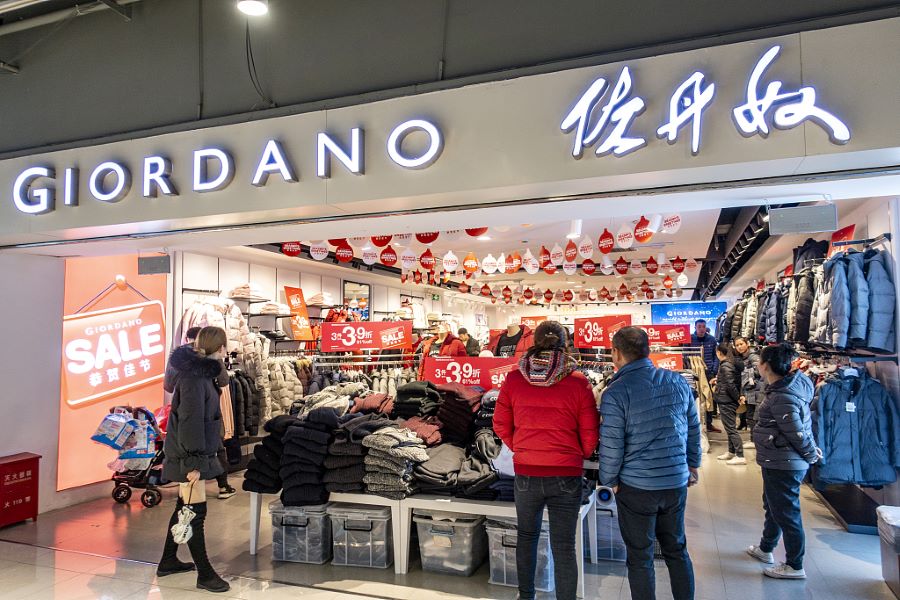Giordano exposed by China overreliance

The clothing retailer warned that its net profit fell by up to 47% in the first half of this year amid slumping sales in its key Greater China markets
Key Takeaways:
- Giordano said it will report a net profit of HK$100 million to HK$130 million in the first half of this year, down sharpy from HK$190 million a year earlier
- The clothing chain is the latest in a growing number of retailers being pressured by weak consumer spending in China
By Warren Yang
Despite its global-sounding name, Giordano International Ltd. (0709.HK) still relies heavily on one particular part of the world for its business, namely, Greater China. That dependency is putting a squeeze on the company as growing consumer caution on the Chinese Mainland causes the market to rapidly lose its luster.
Last Thursday, Giordano said that its net profit for the first half of this year will be somewhere between HK$110 million ($14 million) and HK$130 million, down substantially from HK$190 million a year earlier, according to its profit warning. While one-off expenses and falling profits from its Korean joint venture were partly to blame, weak sales in Mainland China and Hong Kong were the big culprit behind the underwhelming result.
Giordano has been trying to live up to its global-sounding name, which evokes images of Italian high fashion despite its roots in Hong Kong. But despite its move into other markets, China and Hong Kong are still critical for the company. Its latest profit warning didn’t provide a geographic breakdown, but China and Hong Kong – along with Macau and Taiwan, which make up Greater China – accounted for about 42% of its total revenue in the first quarter of this year. That share was probably similar in the three months through June.
The contribution from China and Hong Kong did decrease quite a bit in this year’s first quarter from a year earlier, dropping by more than 5 percentage points. But that points more to problems with the company’s Greater China operations, instead of suggesting a notable acceleration of its overseas expansion.
Giordano’s Greater China sales dropped about 13% year-on-year in the three months to March this year, while those in Southeast Asia and Australia rose about 9% to account for about 41% of the company’s total revenue. Sales for Middle Eastern countries in the Gulf Cooperation Council area increased about 10%. The growth in those regions outside Greater China isn’t bad, though it’s also hardly spectacular, especially in the Middle East, where Giordano isn’t gaining much traction despite three decades in the region.
And considering that Giordano also entered Southeast Asia quite early, back in the 1980s, less than 10 years after its founding in Hong Kong, revenue from the region is somewhat disappointing.
The slowness of its international expansion is leaving Giordano stuck at home with its heavy reliance on Mainland China and Hong Kong to drive its revenue growth. That was fine for three decades when China was growing at breakneck speed, overtaking Japan to become the world’s second largely economy. But it’s become more problematic as growth has slowed sharply in the last two years and consumers rein in their spending.
In Mainland China, which accounted for about 17% of Giordano’s revenue last year, retail sales growth slowed to just 2% in June, the slowest pace since December 2022, from an already-weak 3.7% in the previous month. Consumer sentiment in Hong Kong is even worse, with retail sales in May plummeting 11.5% year-on-year.
Brick-and-mortar store reliance
Giordano is also hamstrung by a heavy reliance on its brick-and-mortar store network, which puts it in a difficult position against companies with large online presences, not to mention purely virtual retailers like Pinduoduo (PDD.US) and fast fashion sensation Shein.
Giordano traces its roots back to 1981 when it was set up by Jimmy Lai, the controversial figure behind the Apple Daily. The company has struggled to stay relevant with the rise of big fast fashion chains like Shein and Uniqlo, and was at the center of a colorful boardroom fight earlier this year. In April, the Hong Kong family behind local property giant New World Development, which holds 24% of Giordano, helped to oust Peter Lau Kwok Kuen as Giordiano’s CEO and chairman two years after a failed attempt to take the company private.
It’s pretty evident that Giordano needs to expand geographically to buffer itself against downturns in the highly connected and slowing economies in Hong Kong and Mainland China. Chinese apparel shops aren’t the only ones feeling the pinch, with sellers of more discretionary products like cars and jewelry also reporting slowdowns. Early this month, cosmetics seller Yatsen (YSG.US), abruptly slashed its second-quarter revenue forecast less than two months after giving its original guidance.
Aware of its heavy China exposure, Giordano seems to be trying to accelerate its overseas expansion. In one of the latest movements on that front, the company announced a partnership in January with Bridgelinkx Ventures to expand in Canada, and it’s also trying to double its presence in India.
Giordano shares are down more than 80% from a high in 2013 and now trade at a price-to-sales (P/S) ratio of well below 1. Their price-to-earnings (P/E) ratio isn’t too exciting either at around 7. Still, the company’s stock is faring better than struggling rival Esprit (0330.HK), whose P/E ratio is 6.3 and P/S is just 0.06. Then again, Esprit is faring far worse than Giordano these days, and has been closing stores shedding assets in a bid to save its sinking ship.
Giordano has yet to reach such a state of crisis, but global expansion still seems imperative for the company to stabilize its future. While it’s taken steps in that direction, the latest profit warning shows that it remains quite reliant on Greater China despite decades of efforts to branch out.
An acquisition could help Giordano grow quickly overseas, though it’s far from clear if it has the resources to do that. After all, its cash holdings shrank last year to about $92 million in dollar terms. Giordano profited for years off demand for cheap, yet trendy apparel from China’s increasingly fashion-conscious consumers. But times have changed, and now the company needs to wean itself from a more mature Chinese market that once nurtured it.
To subscribe to Bamboo Works free weekly newsletter, click here




